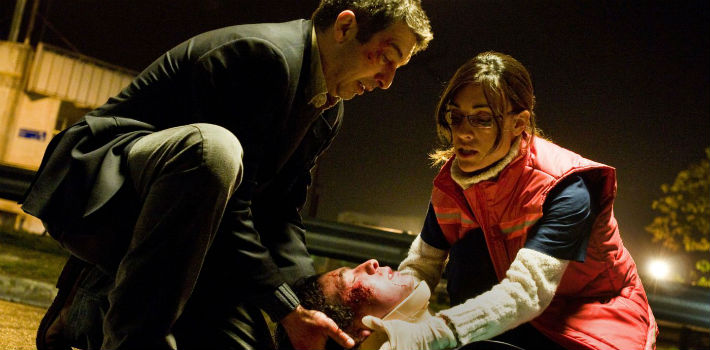
Carancho is a film noir in the original sense of the phrase. The first 60 minutes are spent in almost total gloom, the seediness of the downtown Buenos Aires night broken only by headlights, ambulance sirens, and the cold neon lighting of a hospital emergency room.
The two protagonists are engaged in an equally bleak existence. We first see Héctor Sosa (Ricardo Darín) taking a beating on the streets. “You couldn’t even wait until after the funeral?” asks one of his assailants with a kick. Minutes later, a young paramedic Luján Olivera (Martina Gusmán) arrives on the scene of an auto accident, and Sosa is there again — hunched over a casualty, his piercing eyes and weathered face like the vulture of the film’s title.
But Sosa helps Luján load the victim into the ambulance, and trails the vehicle in his car. Lujan is intrigued. “Do you know the guy who helped us?” Luján asks the driver. “He’s following us.”
“Yeah, don’t worry. He’s coming to the hospital.” Far from being a good Samaritan, Sosa is a crooked attorney, working for the shadowy Foundation ever since he lost his license for some unspecified offense. Their business: profiting from the 8,000 road deaths, and countless accidents, that happen every year in Argentina. Over 100,000 have been killed on the country’s roads since 2000, the film’s titles tell us.
Sosa swoops in on the victims of auto smashes and helps them sue for compensation, taking the lion’s share for his employers. Waiting rooms, funeral homes, outside operating theaters: all are fair hunting grounds. “If it could have been avoided, it’s not an accident, it’s an incident,” he tells one distraught crash victim.
He’s not above staging “incidents” either: in one memorable scene, he breaks a client’s leg with a sledgehammer and directs him to throw himself in front of traffic, although it doesn’t go quite to plan.

Luján and Sosa soon forge a doomed relationship, each seeking escape from their business in death and injury. Sosa is not entirely unsympathetic to begin with: he justifies his business as “social work,” helping those without insurance to cover their medical costs, and as a temporary measure until he regains his license. But with the romance, his conscience begins to stir, and he looks for one last job so he can leave the business for good.
Needless to say, his crime bosses — including a bent local police chief known as El Perro — have other ideas. Darín, previously seen as a careworn investigator in 2009’s The Secret in their Eyes, shows through a single look Sosa’s sense of entrapment and impossibility of escape. The film’s oppressive tone, akin to director Pablo Trapero’s previous work El Bonarense (2000) about corrupt cops, is leavened by dashes of gallows humor and Trapero’s light-touch rendering of the relationship between the protagonists.
The high-octane ending, involving multiple staged collisions, gunfights, and murders, has been criticized by some reviewers as fanciful, a reminder that we’re dealing with fiction, even if inspired by fact. But I decided to revisit Carancho, some five years after its release, because its content seems newly relevant.
A synonym for vulture, buitre, has defined Argentinean political discourse over the past year in relation to the US “vulture funds” who, according to the government, are enriching themselves at the expense of an indebted country. The government of Cristina Kirchner has portrayed international lenders as parasites, profiting from Argentina’s misfortune.
Carancho also raises questions over the role of individuals in webs of corruption and immorality that are so ingrained as to appear normal and inescapable.
But beyond this coincidence, Carancho also raises questions over the role of individuals in webs of corruption and immorality that are so ingrained as to appear normal and inescapable.
The scandal over the mysterious death of prosecutor Alberto Nisman, found with a gunshot wound to the head one month ago on Thursday, is set to heighten this week. On Wednesday, new forensic reports are due, alongside a massive protest march convened by the judiciary calling for freedom to carry out their work without fear.
If Nisman’s charges allegations were true — and they were repeated on Friday by his replacement Girado Pollicita — then a network of police, intelligence operatives, judicial officials, and senior politicians reaching up to President Cristina Kirchner herself were engaged in a cover-up over Iran’s role in the 1994 AMIA bombing. Dozens of people will have taken individual decisions to conceal evidence, or look the other way, denying justice the families of the 85 victims and allowing the real perpetrators to walk free.
“The mistake is viewing the issue of corruption as one of institutions and not of people. Corruption doesn’t depend on other people, it depends on each one of us. And this isn’t only true for Argentina,” Trapero said on Carancho‘s release.
But the issue isn’t only individual decisions to pervert or obstruct the course of justice. If the information contained within Nisman’s 300-page dossier is correct, Kirchner and her inner circle plotted to profit from the murder of Argentinean citizens, accepting cheap oil and preferential trade agreements from Tehran in return for dropping investigations against the suspects.
Benefiting from the death and suffering of others? That sounds like a good definition of a vulture to me.
Edited by Guillermo Jimenez.
 Versión Español
Versión Español












